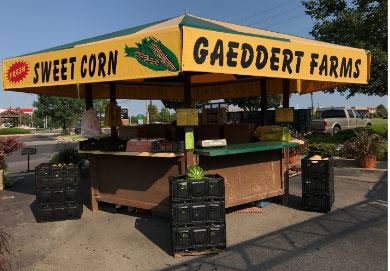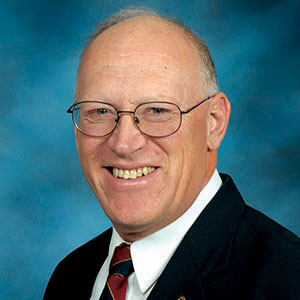Kansas Profile – Now That’s Rural: Tonya Martisko, Gaeddert Farms Sweet Corn
September 30, 2020
By Ron Wilson, director of the Huck Boyd National Institute for Rural Development at Kansas State University.
Sweet corn. It’s one of the joys of summer. Freshly picked sweet corn, cooked and served with some butter and salt, can be a summertime treat. When there happens to be extra sweet corn, it also can be a benefit when it is donated for families facing food insecurity.
Tonya Martisko and Julie Ball are sisters and owners and operators of Gaeddert Farms Sweet Corn, based on the third-generation family farm near Buhler.
Gaeddert Farms sells sweet corn at Farmers Markets in numerous Kansas towns.| Download this photo.
Gaeddert Farms, one of the state’s leading vendors of sweet corn, has been generous to many families in need. This generosity caused the company to be recognized as an Ag Hero by the Kansas Department of Agriculture during the 2020 Ag Growth Summit.
“We’ve been doing this since grade school,” Tonya said with a smile. She and Julie are daughters of Leon and Ruth Gaeddert. The Gaedderts had a family garden which included sweet corn.
“When we had extra, we would take it to our grandparents’ house in Buhler and sell it from the front yard,” Tonya said. “We were excited if we sold five dozen in one day.”
The Gaedderts started selling sweet corn direct from the farm and at farmers’ markets. Tonya and Julie grew up, married, started families and expanded the sweet corn business. In 1996, the Gaedderts opened a retail stand location in Hutchinson.
“About 2000, we really made a commitment to grow the business,” Tonya said. Today, they sell at farmers’ markets in Hutchinson and Wichita, plus selling from their distinctive green-and-gold canopies at their seasonal retail stands in Hutchinson, McPherson, Newton, Andover, Derby, Salina and five in Wichita.
That’s a lot of sweet corn. It requires a lot of work and management. The Gaedderts typically begin planting sweet corn in early April. From then on, multiple plantings are staggered to get fresh sweet corn for six to eight weeks.
The Gaeddert Farms website says: “Planning for that perfect timing can be difficult to do. So many factors come into consideration, most of which we have no control over, such as Kansas weather. There have been years when some of our crop has been hailed out, drowned out, frozen out and even sustained damage from high winds. So goes the life of a farmer.”
Freshness and quality are emphasized by the Gaedderts. “We start picking corn at three in the morning and sell that corn on the same day,” Tonya said. Estimating consumer demand can be tricky.
“Some days we sell out and some days we don’t,” Tonya said. “If there’s any extra, we hate to throw it away.”
As a result, they worked out an arrangement with the Kansas Food Bank to pick up the excess. It was the Kansas Food Bank, based at the Cargill Cares Complex in Wichita, which nominated Gaeddert Farms for the Ag Hero award.
The Food Bank nomination noted: “In their 12-year history with us, they have donated over 454,000 pounds of fresh produce and they are still going strong. Fresh produce is one of the first things that is passed up at the grocery store by cash-strapped households. Yet, fresh produce is one of the most needed items for people who have underlying health issues … Gaeddert Farms has stepped up tremendously this year to provide missing meals for families in need.”
The Gaeddert family also has ventured into agritourism. For a number of years, they offered a corn maze. In 2018, they opened their sunflower fields for visitors. Now they conduct an annual Sunflower Festival, a Craft and Art Market with more than 40 vendors, and even a 5K and one-mile trail run through their 16-acre sunflower field.
All this is located on the farm near the rural community of Buhler, population 1,327 people. Now, that’s rural.
For more information, go to www.gaeddertfarms.com or www.kansasmaze.com.
Sweet corn and sunflowers are among the joys of summer and fall in Kansas. We commend Tonya Martisko, Julie Ball and all the Gaeddert family for making a difference with their productivity as well as their generosity. The results are sweet.
Audio and text files of Kansas Profiles are available at http://www.kansasprofile.com. For more information about the Huck Boyd Institute, interested persons can visit http://www.huckboydinstitute.org.
-----------
The mission of the Huck Boyd National Institute for Rural Development is to enhance rural development by helping rural people help themselves. The Kansas Profile radio series and columns are produced with assistance from the K-State Research and Extension Department of Communications News Media Services unit. A photo of Ron Wilson is available at http://www.ksre.ksu.edu/news/sty/RonWilson.htm. Audio and text files of Kansas Profiles are available at http://www.kansasprofile.com. For more information about the Huck Boyd Institute, interested persons can visit http://www.huckboydinstitute.org.


